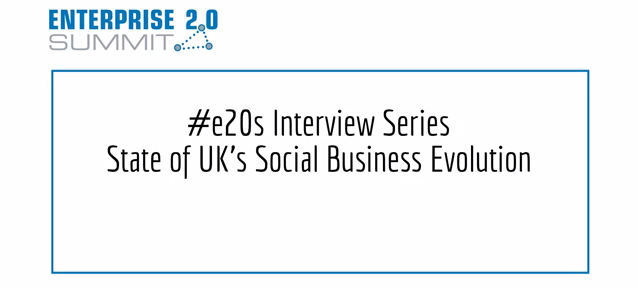This is the next in a series of posts which present different views on the state of Social Business in the UK from a video interview series compiled by our friends at Kongress Media. Around our #e20s Meetup sessions Bjoern Negelmann asked well known consultants, practitioners and thought leaders in this space where we are with digital and social collaboration compared to the rest of Europe and elsewhere.
Here is our very own Alan Patrick, one of the 3 founders of Agile Elephant. We met in the early days of OpenCoffee and Tuttle Club meetups, and put together the Patchwork Elephant series of social business events which were the progenitor of our new company this year. Alan will be heavily involved in presenting the workshop sessions of the Enterprise 2.0 Summit London. He’s well known as a social collaboration speaker and influencer, as well as being an expert on data analytics.
Watch the video, but here are some highlights:
I think we have still got quite a lot of differences of opinion
the reason we called ourselves the Agile Elephant is everybody sees different bits of the Elephant and believes that is what it is
today there were arguments about what;s the state of social collaboration today – anything from complete revolution to actually things are just going to stay the way they are
still a lot of discussion and a lot of debate
from our analysis we’ve seen 3 different groups
best run British companies or top 50 companies who people want to work for who are definitely pushing very hard around engagement and collaboration of the workforce, what they’ve basically realised is that higher employee engagement drives better results
another group are doing it for economic reasons, all of them are start-ups or small companies where the traditional structures don’t work well enough
a third group are companies who often have a history of being jointly owned (like John Lewis) where they are starting to experiment with new ownership models to drive productivity in the business
nobody is doing this just for the sake of being social, they’re doing it to try and get business benefits
other people are trying to manage very global businesses and are using social technologies to keep in touch with very diverse populations
“the future is here, but unevenly distributed”
the early driver was definitely to increase sales
you’ve started to see people looking at it for cost reduction, things like increasing customer service or increasing internal business collaboration
and there are general business benefits to have more engaged people, so those three are the big value drivers at the moment
If you want to hear Alan and find out more and about what works, what doesn’t and what next then take a look at the Enterprise 2.0 Summit London on November 26. More information here.
More #e20s state of UK social business interviews in the series here.

